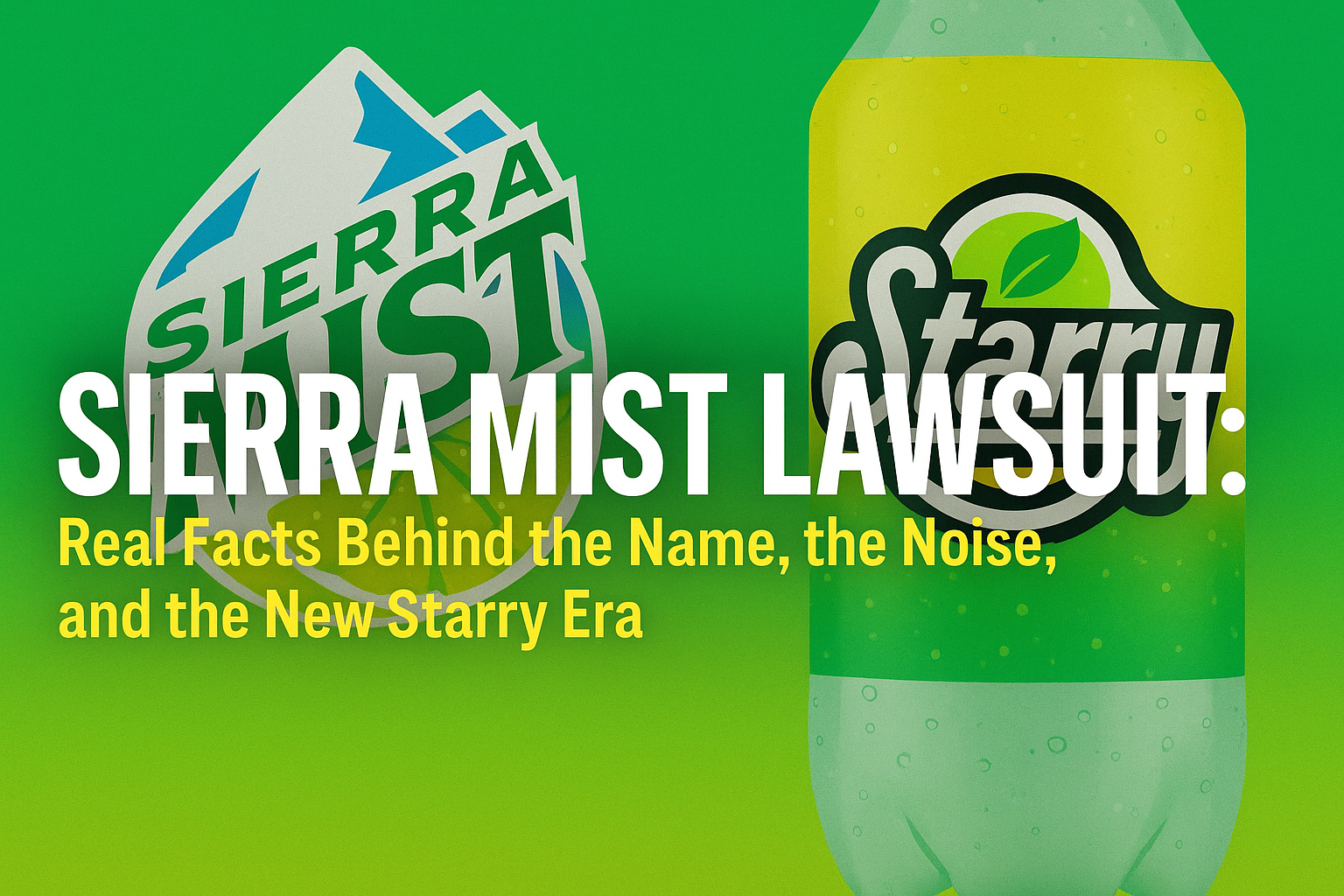In recent months, online searches about a possible Sierra Mist lawsuit settlement have risen sharply, leading to growing confusion among consumers. This surge in interest is largely driven by viral social media posts, low-quality blog articles, and short-form videos that present unverified or speculative claims as if they were confirmed legal facts, despite the absence of supporting court records or official statements. Some of these claims allege that Sierra Mist was involved in a false advertising lawsuit, asserting that the product’s ingredients, labeling, or marketing messages were deceptive—despite the lack of verified court filings, regulatory actions, or official findings to support such allegations. Other reports go a step further by referencing an alleged trademark dispute between PepsiCo and a social media influencer whose username or online name closely resembles the discontinued soda brand, a claim that has circulated widely despite the absence of publicly available court records confirming such a case.
As these narratives spread online, they are frequently repeated without credible sources, court filings, or official confirmations, making it increasingly difficult for readers to distinguish between speculation and verified legal facts. In many instances, unrelated developments—such as routine brand rebranding decisions or individual influencer content—have been misinterpreted or exaggerated and presented as supposed evidence of a major lawsuit or settlement that, in reality, does not exist. This article aims to clarify the situation by clearly separating fact from fiction, addressing the most common rumors, and explaining what is actually known based on verifiable legal and public information, rather than relying on online speculation or unsubstantiated claims.
What Is Sierra Mist?
Sierra Mist was a lemon-lime flavored soft drink produced and marketed by PepsiCo. The beverage was originally introduced as PepsiCo’s response to well-established competitors such as Sprite and 7UP, with the goal of capturing market share in the highly competitive citrus soda category. Over the years, Sierra Mist underwent multiple formula revisions and marketing updates as PepsiCo worked to refine the beverage’s taste profile and better align the brand with changing consumer preferences and market trends.
For more than two decades, Sierra Mist remained available in stores across the United States and select international markets, gradually building brand recognition and a loyal consumer base over its extended time on the market. However, despite its long market presence, Sierra Mist struggled to keep pace with leading lemon-lime sodas in terms of market share and consumer demand. Ultimately, PepsiCo chose to discontinue Sierra Mist as part of a broader rebranding strategy, making room for a new lemon-lime soda designed to better align with modern branding, evolving consumer tastes, and competitive market trends.
Was There a Sierra Mist Lawsuit?
Short answer: No confirmed lawsuit settlement exists.
As of 2025, there is no verified class action lawsuit or court-approved settlement involving Sierra Mist that resulted in compensation or financial relief for consumers. While numerous online articles, social media posts, and video content claim that Sierra Mist was the subject of a major lawsuit, these assertions are not supported by credible legal evidence, such as court filings, judicial rulings, or official regulatory actions. A legitimate class action lawsuit would typically involve publicly accessible court filings, clearly identified plaintiffs, judicial rulings, and an officially appointed claims administrator—none of which exist in connection with Sierra Mist.
Despite repeated references to alleged false advertising claims or legal disputes, reviews of available court records and regulatory announcements reveal no confirmed judgments, settlements, or enforcement actions against PepsiCo that are specifically tied to Sierra Mist. As a result, claims about a “Sierra Mist lawsuit settlement” appear to be based on misinformation or online speculation, rather than on documented legal proceedings, verified court records, or official regulatory actions.
Rumors About False Advertising Claims
Some online sources and social media posts have alleged that PepsiCo misrepresented the ingredients or marketing claims associated with Sierra Mist, suggesting that the product’s labeling or advertising practices may have been misleading to consumers. However, a review of publicly available legal records and regulatory information does not support these claims, as there is no verified evidence of court rulings, enforcement actions, or official findings confirming misleading advertising related to Sierra Mist.
To date, no nationwide consumer class action lawsuit related to Sierra Mist advertising or ingredients has been certified by a court. Additionally, there has been no enforcement action or public warning issued by the FDA confirming that Sierra Mist’s labeling or marketing practices violated federal regulations. Most importantly, there has been no announcement of a settlement fund, official claims website, or consumer reimbursement process, all of which are standard and publicly disclosed features of legitimate class action settlements.
Without verified court filings, judicial rulings, or regulatory findings, these false advertising allegations remain unsubstantiated rumors rather than established legal facts. Consumers should therefore approach such claims with caution and rely on confirmed legal sources and official records, rather than unverified or speculative online reports.
Trademark Dispute With a Social Media Creator?
Another claim circulating online involves a TikTok or YouTube creator allegedly using the name “Cierra Mistt,” who stated that PepsiCo accused her of trademark infringement due to the similarity between her online name and the Sierra Mist trademark. These allegations have fueled confusion and contributed to the broader misconception that a major lawsuit or consumer settlement took place, despite the lack of verified legal records supporting such claims.
It is important to clarify that trademark enforcement actions are fundamentally different from consumer lawsuits. In most situations, when a company believes its trademark rights may be infringed, the issue is addressed privately through cease-and-desist letters or informal legal communications, rather than through public court proceedings or large-scale litigation. Even when such disputes escalate, they typically involve narrow legal questions between the trademark holder and the individual party, rather than claims brought on behalf of consumers or class action litigation.
At this time, there is no publicly available court case, filing, or judgment confirming that such a trademark dispute was formally litigated. Moreover, even if a trademark issue did occur, it would not result in a consumer settlement or compensation, as trademark disputes do not involve consumer harm allegations or class action relief.
Why Was Sierra Mist Discontinued?
Sierra Mist was officially discontinued and replaced by Starry as part of a strategic rebranding decision by PepsiCo. According to the company, the move was intended to refresh its presence in the highly competitive lemon-lime soda market, rather than to address any legal or regulatory issue.
PepsiCo has indicated that sales performance and intense market competition were key factors behind the decision. Sierra Mist struggled to capture significant market share against long-established rivals, which ultimately prompted the company to rethink its overall approach to the brand. As a result, PepsiCo opted for a full brand relaunch rather than making incremental changes to the existing product.
Importantly, PepsiCo has made it clear that the discontinuation of Sierra Mist was not linked to any lawsuit or legal settlement. Instead, Starry was introduced with refreshed branding and marketing designed to appeal to younger consumers and strengthen PepsiCo’s competitive position within the lemon-lime soda market.
Sierra Mist Lawsuit Settlement Amount: Is There One?
Despite a high volume of online searches asking about a “Sierra Mist lawsuit settlement amount,” there is no settlement amount to report, because no confirmed lawsuit or settlement exists involving Sierra Mist. Much of the confusion appears to stem from misleading articles and social media content that reference a supposed settlement without providing verifiable legal details, such as court filings, case numbers, or official announcements.
In a legitimate class action case, consumers would be able to identify clear, verifiable indicators such as a case number, a federal or state court record, and the appointment of an official claims administrator responsible for managing settlement notices and payments. These elements are essential for any court-approved settlement and are typically easy to verify through publicly available court records and official announcements.
None of these indicators exist for Sierra Mist. There are no publicly accessible court filings, no settlement notices, and no official claims process associated with the brand, further confirming that reports of a Sierra Mist lawsuit or settlement are unfounded.As a result, claims about a Sierra Mist lawsuit settlement amount are unsupported and should be viewed as misinformation, rather than as established or verified legal fact.
Final Thoughts
The Sierra Mist lawsuit narrative highlights how viral online rumors can easily be mistaken for real legal action, especially when claims are repeated across social media, blogs, and video platforms without proper verification. In this case, speculation about lawsuits, settlements, and trademark disputes involving Sierra Mist has circulated widely despite the absence of court filings, judicial rulings, or official regulatory announcements confirming that any such legal action occurred. This underscores the importance of distinguishing between unverified online claims and documented legal facts, particularly when evaluating reports about lawsuits or consumer settlements.
Consumers are best served by relying on official court records, government agencies, and credible legal reporting, rather than social media speculation or click-driven content designed to attract attention without verification. For clear, factual, and up-to-date information on legitimate class action lawsuits and settlements, continue following lawsuitdeck.com, where accuracy, transparency, and evidence-based reporting remain the top priority.
Muhammad Suleman Ahmad is a content writer covering lawsuits, legal explainers, and court-related topics for LawsuitDeck.com. His work is structured for clarity and general understanding.


